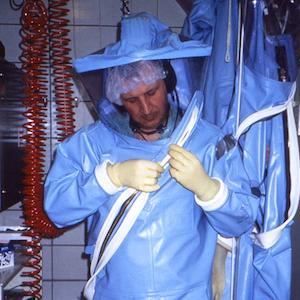The Washington Post has reported that, without explanation, the CDC abruptly canceled a conference on how climate change will impact human health. Good.
There's little doubt why the CDC canceled it. The Trump Administration is skeptical of anthropogenic climate change, so somebody -- perhaps President Trump himself -- likely made a single phone call and that was that. Journalists and the Twitterverse will surely go berserk, but they should not. Climate change falls well outside the CDC's area of expertise.
Founded in 1946, the CDC's first mission was to stop the spread of malaria in the United States. From that humble beginning, it became the world's leading infectious disease control organization. The scientists who wear "space suits" in laboratories to work on dangerous pathogens and respond to global outbreaks of diseases like Ebola are the superheroes of microbiology.
Over time, the CDC took on other responsibilities. Its focus shifted from infectious disease to other health and safety threats, many of which are well covered by other agencies. The CDC, for instance, now analyzes workplace accidents, but that's already studied in-depth by the Department of Labor (via the Bureau of Labor Statistics and OSHA). The NIH has entire institutes dedicated to allergies and mental health. The FBI is the most competent agency to handle crime data. And the EPA is the nation's leading source of information on climate change and environmental health hazards.
Yet, the CDC is currently engaged in all of those fields, too. Is redundancy really vital to the CDC's mission, or should it go back to its roots and focus solely on infectious disease? A solid case can be made for the latter. Consider the following:
- 48 million Americans acquire a foodborne illness every single year; 3,000 will die of them.
- Influenza/pneumonia is a top 10 cause of death in the United States.
- Antibiotic resistant bacteria are a growing (and frightening) threat.
- Zika, Ebola, and other emerging infectious diseases are no longer limited to developing countries; they will continue to make their way to American shores.
- Millions of Americans still falsely believe that vaccines are unsafe.
- There are more than 700,000 healthcare-associated infections in the U.S. every year, many of which are fatal.
Addressing that list alone would keep the CDC busy for decades. Infectious disease continues to claim the lives of thousands of Americans annually. Given that reality, it is definitely worth asking if topics like climate change are a good use of the agency's resources*. "Mission creep" applies just as much to the CDC as it does to the military. But don't count on that discussion happening anywhere in the mainstream media.
*It is quite possible that climate change will worsen some infectious diseases, like malaria. But these diseases need to be addressed regardless of climate change. Additionally, the health impacts of climate change are already studied by the EPA and NIEHS.




